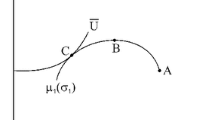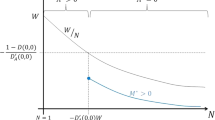Abstract
How people privately and collectively adapt to climate risk can affect the costs and benefits of public mitigation policy (e.g., Kyoto); an obvious point often neglected in actual policy making. Herein we use the economic theory of endogenous risk to address this optimal mix of mitigation and adaptation strategies, and examine how increased variability in climate change threats affects this mix. We stress that a better understanding of the cross-links between mitigation and adaptation would potentially make it possible to provide more risk reduction with less wealth. Policies that are formulated without considering the cross-links can unintentionally undermine the effectiveness of public sector policies and programs because of unaddressed conflicts between the strategies. We also discuss the cross-disciplinary lessons to be learned from this literature, and identify important research questions to spur discussion in the next round of inquiry.
Similar content being viewed by others
References
Agee, M. and Crocker, T.: 1996, ‘Parental Altruism and Child Lead Exposure’, Journal of Human Resources, 31, 677–691.
Archer, D. and Shogren, J.: 1996, ‘Endogenous Risk in Weed Control Management’, Agricultural Economics, 14, 103–122.
Arnott, R. and Stiglitz, J.: 1988, ‘The Basic Analytics of Moral Hazard’, Scandinavian Journal of Economics, 88, 383–413.
Arrow, K.: 1963, ‘Uncertainty and the Welfare Economics of Medical Care’, American Economic Review, 53, 941–973.
ABARE and Department of Foreign Affairs and Trade: 1995, Global Climate Change: Economic Dimensions of a Cooperative International Policy Response Beyond 2000, ABARE, Canberra, Australia.
Barrett, S.: 1998, ‘On the Theory and Diplomacy of Environmental Treaty-Making’, Environmental and Resource Economics, 11, 317–333.
Barron, E.: 1995, ‘Climate Models: How Reliable are their Predictions’, Consequences, 1, 16–27.
Benedick, R.: 1991, Ozone Diplomacy: New Directions in Safeguarding the Planet, Harvard University Press, Cambridge MA.
Bradley, M. and Lehman, D.: 1986, ‘Comparative Equilibrium versus Comparative Statics’, Canadian Journal of Economics, 19, 526–538.
Bolin, B.: 1998a, ‘The Kyoto Negotiations on Climate Change: A Science Perspective’, Science, 279, 330–331.
Bolin, B.: 1998b. ‘Key Features of the Global Climate System to be Considered in Analysis of the Climate Change Debate’, Environment and Development Economics, 3, 348–365.
Bouzaher, A. Holtkamp, D, Reese, R. and Shogren, J.: 1995, ‘Economic and Resource Impacts of Policies to Increase Organic Carbon in Agricultural Soils’, Soil Management and Greenhouse Effects, [Lal, R., J. Kimble, E. Levine, and B. Stewart, eds.], CRC Lewis Publishers, Boca Raton, LA, 309–328.
Brown, Sir J.: 1999, “Using Technology to Transform an Organization”, speech at the NATO Seminar on Technology, Old Dominion University, Norfolk, Virginia, October 18, 1999.
Brown, S.: 1999, Personal correspondence, Winrock International.
Chichilnisky, G. and Heal, G.: 1993, ‘Global Environmental Risk’, Journal of Economics Perspectives, 7, 65–86.
Crocker, T., Forster, B., and Shogren J.: 1991, ‘Valuing Potential Groundwater Protection Benefits’, Water Resources Research, 27, 1–6.
Crocker, T. and Shogren, J.: 1997, ‘Endogenous Risk and Environmental Program Evaluation’, Environmental Program Evaluation. A Primer. [G. Knaap and T.J. Kim, eds.], University of Illinois Press, Urbana, IL, pp. 255–269.
Cook, P. and Graham, D.: 1979, ‘The Demand for Insurance and Protection: The Case of Irreplaceable Commodities’, Quarterly Journal of Economics, 61, 143–156.
Dawes, R.: 1988. Rational Choice in an Uncertain World, Harcourt Brace Jovanovich, San Diego, CA.
Dowlatabadi, H. and Morgan, M. G.: 1993, ‘A Model Framework for Integrated Studies of the Climate Problem’, Energy Policy 21, 209–221.
Ehrlich I. and Becker, G.S.: 1972, ‘Market Insurance, Self-insurance and Self-protection’, Journal of Political Economy, 80, 623–648.
Falk, I. and Mendelsohn, R.: 1993, ‘The Economics of Controlling Stock Pollutants: An Efficient Strategy for Greenhouse Gases’, Journal of Environmental Economics and Management, 25, 76–88.
Graham, J. and Wiener, J.: 1996, Risk vs. Risk, Harvard University Press, Cambridge.
Hiebert, L.: 1983, ‘Self Insurance, Self Protection, and the Theory of the Firm’, Southern Economic Journal, 50, 160–168.
Huber, S. and Douglass, C.: 1998, Two Perspectives on Global Climate Change. A Briefing Book, Center for the Study of American Business, Washington University of St. Louis.
Intergovernmental Panel on Climate Change (IPCC): 1996, Climate Change 1995: Impacts, Adaptations and Mitigation of Climate Change: Scientific-Technical Analyses. Contribution of Working Group II to the Second Assessment Report of the Intergovernmental Panel on Climate Change, R. Watson et al., eds., Cambridge University Press, Cambridge, MA.
Intergovernmental Panel on Climate Change (IPCC): 1996, Climate Change 1995: Economics and Social Dimensions of Climate Change, The Contribution of Working Group III to the Second Assessment Report of the Intergovernmental Panel on Climate Change [J. Bruce, H. Lee, and E. Haites, eds.]. Cambridge University Press, Cambridge.
Jacoby, H., Prinn, R., and Schmalensee, R.: 1998, ‘Kyoto's Unfinished Business’, Foreign Affairs, July/August, 54–66.
Jaffee, A. and Stavins, R.: 1994, ‘The Energy-Efficiency Gap: What Does it Mean?’, Energy Policy, 22, 804–810.
Jempa, C. and Munasinghe, M.: 1997, Climate Change Policy: Facts, Issues and Analyses, Cambridge University Press, Cambridge, England.
Kane, S.: 1996, ‘Economics of Climate Change’ in Encyclopedia of Climate and Weather, S.H. Schneider (Editor-in-Chief). Oxford University Press, Oxford.
Kane, S., Reilly, J., and Tobey, J.: 1992, ‘An Empirical Study of the Economic Effects of Climate Change on World Agriculture’, Climate Change, 21:17–35.
Lewis, T. and Nickerson, P.: 1989, ‘Self-insurance against Natural Disasters’, Journal of Environmental Economics and Management, 16, 209–223.
Kates, R.: 1978. Risk Assessment of Environmental Hazard. John Wiley & Sons, New York, NY.
Kelly, D. and Kolstad, C.: 1996, ‘Bayesian Learning and Accumulation of Stock Externalities’, working paper, Department of Economics, UC-Santa Barbara.
Kremer, M.: 1996, ‘Integrating Behavioral Choice into Epidemiological Models of AIDS’, Quarterly Journal of Economics, 111, 549–574.
Laffont, J.-J.: 1980. Essays in the Economics of Uncertainty, Harvard University Press, Cambridge, MA.
Manne, A. and Richels, R.: 1997, ‘On Stabilizing CO2 Concentrations: Cost-effective Emission Reduction Strategies’, Energy Modeling Forum 14, April.
Marshall, J.: 1976, ‘Moral Hazard’, American Economic Review, 66, 680–690.
Nakicenovic, N., W. Nordhaus, Richels, R. and Toth, F.: 1994. Integrative Assessment of Mitigation Impacts and Adaptation to Climate Change. HASA, Laxenburg, Austria.
National Academy of Sciences: 1999, Global Environmental Change: Research Pathways for the Next Decade, National Academy Press, Washington, D.C.
National Academy of Sciences: 1983, Risk Assessment in the Federal Government Managing the Process, National Academy Press, Washington, D.C.
Nena, J., President of the Federated States of Micronesia: 1998, September 24, Statement to the 53rd United Nations General Assembly, New York.
Nordhaus, W.: 1994. Managing the Global Commons, MIT Press, Cambridge, MA.
Nordhaus, W., and Boyer, J.: 1998, ‘Requiem for Kyoto: An Economic Analysis of the Kyoto Protocol’, Energy Journal, May, 93–130.
Norgaard, R.: 1989, ‘The Case for Methodological Pluralism’, Ecological Economics, 1, 37–57.
Parry, M. and Carter, T.: 1998. Climate Impact and Adaptation Assessment: The IPCC Method. Earthscan Publications, London.
Peck, S. and Teisberg, T.: 1996, ‘Uncertainty and the Value of Information with Stochastic Losses From Global Warming’, Risk Analysis, 16, 227–235.
Plambeck, E., Hope, C., and Anderson, J.: 1997, ‘The [PAGE95] model: Integrating the Science and Economics of Global Warming’, Energy Economics, 19, 77–101.
Quiggin, J.: 1992, ‘Risk, Self-protection, and Ex Ante Economic Value—Some Positive Results’, Journal of Environmental Economics and Management. 23, 40–53.
Rayner, S. and Malone, E. (eds.): 1998. Human Choice and Climate Change, Battelle, Washington, D.C.
Reilly, J.: 1999, Personal Correspondence. MIT University, Cambridge, MA.
Reilly, J., Hohmann, N., and Kane, S.: 1994, ‘Climate Change and Agricultural Trade: Who Benefits and Who Loses’, Global Environmental Change, 4, 24–36.
Schelling, T.: 1992, ‘Some Economics of Global Warming’, American Economic Review, 82, 1–14.
Shogren, J.: 1991, ‘Endogenous Risk and Protection Premiums’, Theory and Decision, 31, 241–256.
Shogren, J.: 1999, ‘The Benefits and Costs of the Kyoto Protocol’, AEI Press, Washington, D.C.
Shogren, J. and Crocker, T.: 1991a, ‘Risk, Self-Protection, and Ex Ante Economic Value’, Journal of Environmental Economics and Management, 20, 1–15.
Shogren, J. and Crocker, T.: 1991b, ‘Cooperative and Noncooperative Protection Against Transferable and Filterable Externalities,’ Environmental and Resource Economics, 1, 195–214.
Shogren, J., Tschirhart, J., Anderson, T., Ando, A., Beissinger, S., Brookshire, D., Brown, Jr., G., Coursey, D., Innes, R., Meyer, S., and Polasky S.: 1999, ‘Why Economics Matters for Endangered Species Protection’, Conservation Biology, forthcoming.
Sohngen, B., Mendelsohn, R., and Sedjo, R.: 1999, ‘Forest Management, Conservation, and Global Timber Markets’, American Journal of Agricultural Economics, 81, 1–13.
Smit, B., Burton, I., Klein, R.J.T., and Wandel, J.: 2000, ‘An Anatomy of Adaptation to Climate Change and Variability’, Climatic Change, (this issue).
Swallow, S.: 1996, ‘Resource Capital Theory and Ecosystem Economics: Developing Nonrenewable Habitats with Heterogeneous Quality’, Southern Economic Journal, 63, 106–123.
United Nations Framework Convention on Climate Change: 29 May 1992, 31 I.L.M. 849.
United States Office of Science and Technology Policy, 1999, Our Changing Planet: The FY 2000 US Global Change Research Program, Washington, D.C.
Victor, D., Raustiala, K., and Skolnikoff, E.: 1998. The Implementation and Effectiveness of International Environmental Commitments: Theory and Practice, MIT Press, Cambridge.
Virgi, H.: 1999. Personal correspondence, START Secretariat, Washington, D.C.
Viscusi, K.V.: 1998. Rational Risk Policy — the Arne Ryde Memorial Lecture Series. Oxford University Press, Oxford.
Weyant, J. and Hill, J.: 1999, ‘Introduction and Overview: The Costs of the Kyoto Protocol—A Multi-model Evaluation’ Energy Journal, May:vii–xliv.
Whyte, A. and Burton, I.: 1980, Environmental Risk Assessment, John Wiley and Sons, New York.
Wiener, J.: 1999, ‘Global Environmental Regulation: Instrument Choice in Legal Context’, Yale Law Journal, 108, 677–800.
Wigley, T.: 1998, ‘The Kyoto Protocol: CO2, CH4 and Climate Implications’, Geophysical Research Letters, 25, 2285–2288.
Wigley, T., Richels, R., and Edmonds, J.: 1996, ‘Economic and Environmental Choices in the Stabilization of Atmospheric CO2 Concentrations’, Nature, 379, 240–243.
Yohe, G.: 1996, ‘Exercises in Hedging Against Extreme Consequences of Global Change and the Expected Value of Information’, Global Environmental Change, 6, 87–101.
Yohe, G. and Toth, F.: 2000, ‘Adaptation and the Guardrail Approach to Tolerable Climate Change Policy’, Climatic Change, (this issue).
Author information
Authors and Affiliations
Rights and permissions
About this article
Cite this article
Kane, S., Shogren, J.F. Linking Adaptation and Mitigation in Climate Change Policy. Climatic Change 45, 75–102 (2000). https://doi.org/10.1023/A:1005688900676
Published:
Issue Date:
DOI: https://doi.org/10.1023/A:1005688900676




